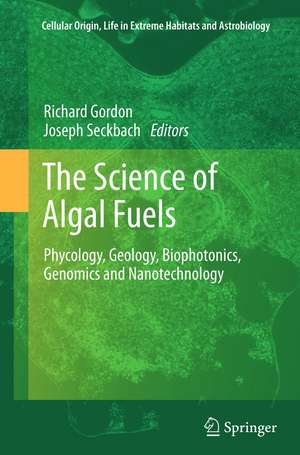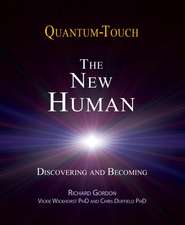The Science of Algal Fuels: Phycology, Geology, Biophotonics, Genomics and Nanotechnology: Cellular Origin, Life in Extreme Habitats and Astrobiology, cartea 25
Editat de Richard Gordon, Joseph Seckbachen Limba Engleză Paperback – 29 ian 2015
| Toate formatele și edițiile | Preț | Express |
|---|---|---|
| Paperback (1) | 956.03 lei 6-8 săpt. | |
| SPRINGER NETHERLANDS – 29 ian 2015 | 956.03 lei 6-8 săpt. | |
| Hardback (1) | 971.01 lei 6-8 săpt. | |
| SPRINGER NETHERLANDS – 3 dec 2012 | 971.01 lei 6-8 săpt. |
Din seria Cellular Origin, Life in Extreme Habitats and Astrobiology
- 18%
 Preț: 1683.66 lei
Preț: 1683.66 lei - 5%
 Preț: 1440.04 lei
Preț: 1440.04 lei - 18%
 Preț: 1839.32 lei
Preț: 1839.32 lei - 18%
 Preț: 1848.33 lei
Preț: 1848.33 lei - 18%
 Preț: 1839.32 lei
Preț: 1839.32 lei - 18%
 Preț: 1222.27 lei
Preț: 1222.27 lei - 18%
 Preț: 1232.26 lei
Preț: 1232.26 lei - 18%
 Preț: 2098.03 lei
Preț: 2098.03 lei - 18%
 Preț: 1228.29 lei
Preț: 1228.29 lei - 18%
 Preț: 2111.46 lei
Preț: 2111.46 lei - 24%
 Preț: 1076.36 lei
Preț: 1076.36 lei - 18%
 Preț: 1828.11 lei
Preț: 1828.11 lei - 18%
 Preț: 951.14 lei
Preț: 951.14 lei - 18%
 Preț: 1219.94 lei
Preț: 1219.94 lei - 18%
 Preț: 1235.08 lei
Preț: 1235.08 lei - 18%
 Preț: 1252.76 lei
Preț: 1252.76 lei - 18%
 Preț: 1263.01 lei
Preț: 1263.01 lei - 18%
 Preț: 956.50 lei
Preț: 956.50 lei - 18%
 Preț: 1234.46 lei
Preț: 1234.46 lei - 18%
 Preț: 1122.58 lei
Preț: 1122.58 lei - 15%
 Preț: 646.11 lei
Preț: 646.11 lei - 18%
 Preț: 1840.91 lei
Preț: 1840.91 lei - 18%
 Preț: 1231.16 lei
Preț: 1231.16 lei - 18%
 Preț: 1251.50 lei
Preț: 1251.50 lei - 18%
 Preț: 961.41 lei
Preț: 961.41 lei
Preț: 956.03 lei
Preț vechi: 1165.88 lei
-18% Nou
Puncte Express: 1434
Preț estimativ în valută:
182.93€ • 190.100$ • 151.40£
182.93€ • 190.100$ • 151.40£
Carte tipărită la comandă
Livrare economică 04-18 aprilie
Preluare comenzi: 021 569.72.76
Specificații
ISBN-13: 9789400799134
ISBN-10: 9400799136
Pagini: 540
Ilustrații: XXXIV, 506 p.
Dimensiuni: 155 x 235 x 28 mm
Greutate: 0.75 kg
Ediția:2012
Editura: SPRINGER NETHERLANDS
Colecția Springer
Seria Cellular Origin, Life in Extreme Habitats and Astrobiology
Locul publicării:Dordrecht, Netherlands
ISBN-10: 9400799136
Pagini: 540
Ilustrații: XXXIV, 506 p.
Dimensiuni: 155 x 235 x 28 mm
Greutate: 0.75 kg
Ediția:2012
Editura: SPRINGER NETHERLANDS
Colecția Springer
Seria Cellular Origin, Life in Extreme Habitats and Astrobiology
Locul publicării:Dordrecht, Netherlands
Public țintă
Upper undergraduateCuprins
Dedication.- Introduction to The Science of Algal Fuels: Psychology, Geology, Biophotonics, Genomics and Nanotechnology.- Preface to The Science of Algal Fuels: Psychology, Geology, Biophotonics, Genomics and Nanotechnology.- Foreword: The Production of Algal Biofuels.- Acknowledgements.- PART 1:METHODS AND WAYS OF RESEARCH.- Quitting cold turkey: rapid oil independence for the USA.- Algal biorefinery: sustainable production of biofuels and aquaculture feed?.- Approaches and prospectives for algal fuel.- From isolation of potential microalgal strains to strain engineering for biofuel.- Integrated approach to algae production for biofuel utilizing robust algal species.- Biological constraints on the production of microalgal-based biofuels.- Adapting mass algaculture for a northern climate.- Nanotechnology for algal biofuels.- From algae to biofuel - engineering aspects.- Making fuel from algae: identifying fact amid fiction.- Algal oils: biosynthesis and uses.- Algal biofuel production through integrated biorefinery.- PART 2: PRODUCTION OF BIODIESELS AND HYDROGEN.- Dinoflagellates as feedstock for biodiesel production.- Biodiesel production from microalgae: methods for microalgal lipid assessment with emphasis on the use of flow cytometry.- Approaches to and perspectives on biodiesel and oil production using algae in Mexico.- Biodiesel production from microalgae: a mapping of articles and patents; Biotechnology of hydrogen production with the microalga Chlamydomonas reinhardtii; PART 3: ALGAE FOR BIOFUEL PRODUCTION.- How to breed diatoms: examination of two species with contrasting reproductive biology.- Fuel from seaweeds: rationale and feasibility.- The contribution of diatoms to worldwide crude oil deposits.- Photobiology and lipid metabolism in algae.- Metabolic pathways in green algae with potential value for biofuels production.- PART 4: FROM WASTE WATER TO FUEL PRODUCTION.- Wastewater treatment pond algal production for biofuel.- Wastewater treatmentintegrated with algae production for biofuel.- Sub-and supercritical water based processes for microalgae to biofuels.
Textul de pe ultima copertă
This volume covers and updates the “hot” topic of biofuels, with numerous international meetings, conferences, congresses, and books on biofuels. Our 61 experts from several countries contributed 26 chapters to The Science of Algal Fuels. Each chapter has been composed as a review article and contains many references for further studies and has been peer reviewed. The target audience of this volume is workers in biofuels, graduate students in biochemistry and lecturers of phycology and biochemistry of the algal world. Algae, seaweeds and cyanobacteria, who are our stars in this book, live in marine and terrestrial habitats and require the Sun for energy, CO2 and aqueous surroundings. Since it is easy to culture algae in a large scale and they yield abundant biomass in a short period, there are farms that grow them in ponds for extracting their natural products. Micro and macro (seaweeds) can produce cheap and plentiful biofuel, biodiesel, or ethanol. The phycological yield to synthesize ethanol is 7.5 times higher than from a similar area of a sugar cane field. Biofuel (such as algal products) may soon be cheaper than the commercial pumping of underground and sea bottom fossil-oil, which causes more air pollution and depends upon political decisions from unstable countries. Industry seeks cheaper and more stable sources of fuel and algal fuel might be a good solution. Thus biofuel (biodiesel, oils, ethanol) might free us from unstable regimes with their “dark gold” sources, and from up and down oil prices. Unfortunately we have not yet reached this level as yet in spite of numerous contestants in this developing research. The industry is at present not in full gear to produce a substantial yield of biofuel from algae. Algal fuel is still a long range of strategy that will involve more R&D. Our hope is that this book will encourage the workers in this field to reach this “promised land” of algal biofuels in the not toodistant future.















